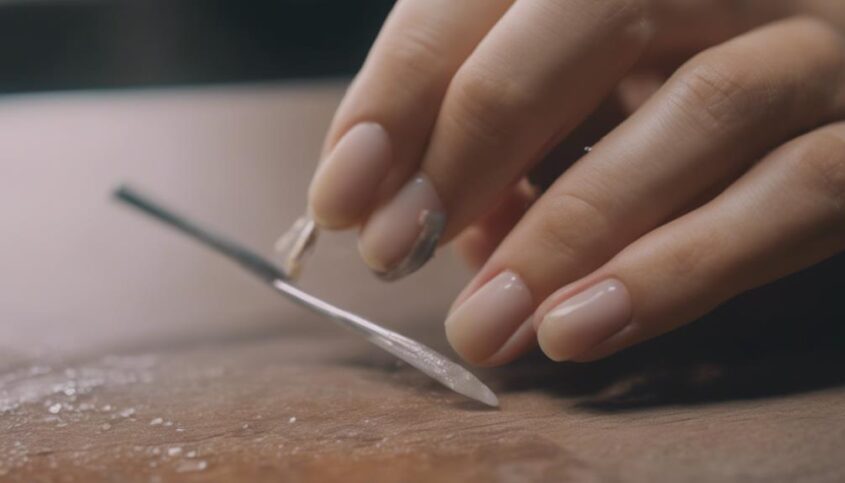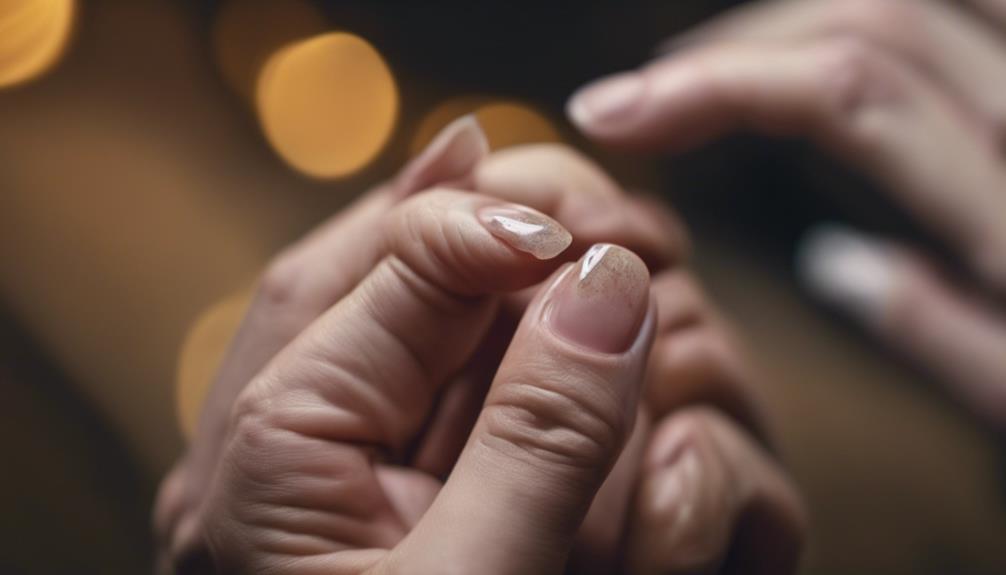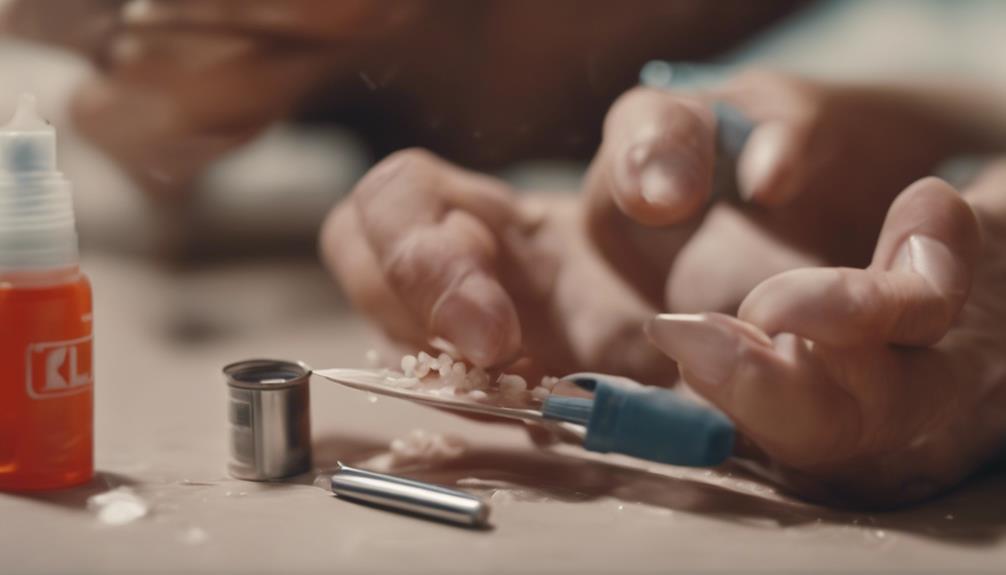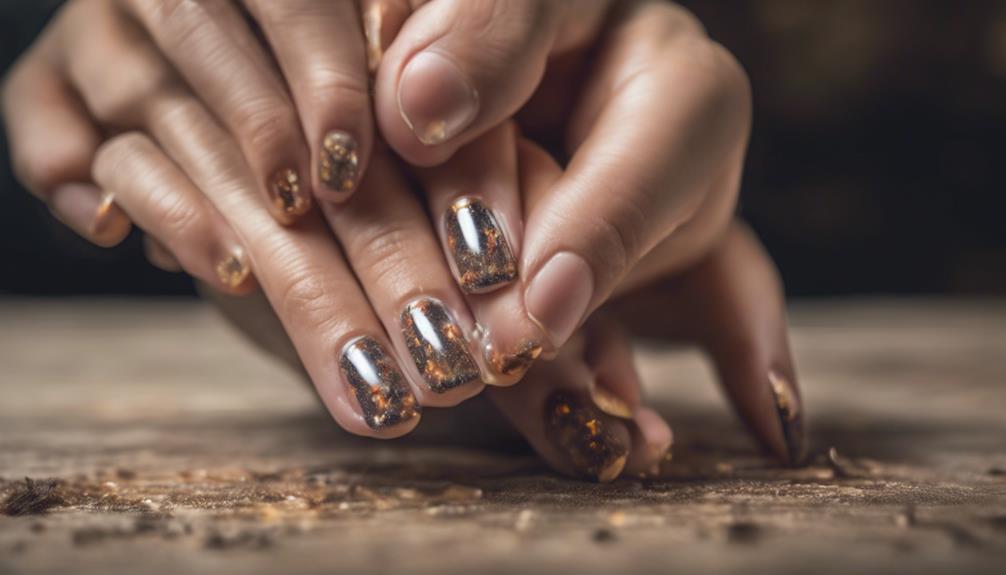What Happens if You Use Super Glue for Fake Nails?

Using super glue for fake nails can result in skin irritation, respiratory issues, accidental skin bonding, and nail damage. It can lead to brittle nails, stripping essential oils, infections, and trauma to the nail bed. Removal may pose challenges, but acetone soak, warm water soak, and oil massage can help. Safety precautions are vital to avoid risks like skin irritation and eye contact. Comparing super glue to nail adhesive shows differences in strength, flexibility, and precision. Understanding these factors is crucial for nail health and safety. Further information on safer alternatives and removal methods is available.
Key Takeaways
- Skin irritation and potential allergic reactions.
- Significant damage to natural nails.
- Brittle and weak nails due to stripping of essential oils.
- Removal challenges such as strong bond difficulty.
- Safety concerns like accidental skin bonding and respiratory issues.
Potential Risks of Using Super Glue

When considering the use of super glue for fake nails, it is essential to acknowledge the potential risks associated with this practice. While super glue is a quick and convenient option for attaching artificial nails, its strong adhesion properties can pose dangers if not used correctly. One significant risk is skin irritation or allergic reactions that may occur due to the harsh chemicals present in super glue. These reactions can range from mild redness and itching to more severe dermatitis.
Moreover, the fumes emitted by super glue can be harmful if inhaled excessively, leading to respiratory issues. Incorrect application of super glue can also result in accidental skin bonding, causing pain and potential damage when trying to separate the skin surfaces. Additionally, if the fake nails need to be removed, the strong bond created by super glue can lead to nail damage or thinning.
Innovations in nail adhesive technology have introduced safer alternatives to traditional super glue, such as nail glue specifically designed for artificial nails. These products offer a gentler formula that reduces the risks associated with using super glue for fake nails, ensuring a safer and more enjoyable nail enhancement experience.
Effects on Nail Health
Considering the potential risks associated with using super glue for fake nails, it is important to understand the effects this adhesive can have on nail health. While super glue can provide a strong bond for fake nails, it can also lead to significant damage to natural nails. The harsh chemicals in super glue can cause nails to become brittle, weak, and prone to breakage. Prolonged use of super glue can strip the nails of essential oils, leading to dryness and potential nail infections. Furthermore, the process of applying and removing fake nails with super glue can cause trauma to the nail bed, resulting in pain and discomfort.
Maintaining nail health is essential for overall well-being, and using super glue for fake nails may compromise the natural strength and resilience of nails. It is crucial to prioritize nail health by opting for safer alternatives that are specifically designed for nail application to prevent long-term damage and promote healthy nail growth.
Removal Challenges and Solutions

To effectively address the removal challenges associated with using super glue for fake nails, it is essential to consider safe and efficient solutions. Super glue can create a strong bond that makes removal a tricky task. Here are three innovative solutions to tackle this issue:
- Acetone Soak: Soaking the nails in acetone can help break down the super glue bond. Acetone is a common ingredient in nail polish remover and can effectively dissolve the glue over time. However, prolonged exposure to acetone can be harsh on the skin, so it's essential to moisturize the hands and nails afterward.
- Warm Water Soak: Another method involves soaking the affected nails in warm, soapy water. The warm water can help soften the glue, making it easier to gently peel or file off the fake nails. This method is gentler on the skin compared to acetone.
- Oil Massage: Massaging the nails and cuticles with oil, such as coconut or olive oil, can also help loosen the super glue. The oil works to break down the adhesive properties of the glue, allowing for easier removal without damaging the natural nails.
Safety Concerns and Precautions
Given the potential risks associated with the use of super glue for fake nails, understanding safety concerns and taking necessary precautions is paramount to ensuring a positive and safe experience. Super glue contains chemicals that can be harmful if not used properly. One of the main safety concerns is skin irritation or allergic reactions. To mitigate these risks, it is advisable to perform a patch test before applying super glue to the nails. Additionally, proper ventilation is essential when using super glue to avoid inhaling fumes that may cause respiratory issues. Furthermore, it is crucial to avoid contact with eyes and mucous membranes as super glue can cause severe irritation if it comes into contact with these areas. When applying super glue for fake nails, ensure that the workspace is well-ventilated, wear protective gloves, and follow the instructions on the product carefully. By adhering to these safety precautions, individuals can enjoy the benefits of using super glue for fake nails without compromising their well-being.
Comparison With Nail Adhesive

When evaluating the choice between super glue and nail adhesive for fake nails, it is essential to consider their adhesive properties and application techniques.
- Adhesive Strength: Super glue is known for its strong bonding capabilities, making it a popular choice for various DIY projects. However, nail adhesive is specifically formulated for use on nails, providing a secure hold without causing damage when it's time for removal.
- Flexibility: Nail adhesives are designed to be more flexible than super glue, allowing for natural movement of the nail without compromising the bond. This flexibility is crucial for fake nails, as they need to withstand everyday activities without lifting or breaking.
- Application Precision: Nail adhesives often come with specialized applicators that make it easier to control the amount of product applied, reducing the risk of mess or excess glue. Super glue, on the other hand, may require more skill and precision during application to avoid accidental spills or overuse.
Innovations in nail adhesive technology continue to enhance the user experience, providing a reliable and user-friendly alternative to super glue for fake nail applications.
Frequently Asked Questions
Can Super Glue Cause Allergic Reactions or Skin Irritation When Used for Fake Nails?
Can super glue cause allergic reactions or skin irritation when used for fake nails? Understanding potential risks is crucial. Always prioritize safety by choosing nail adhesives designed for skin contact to minimize adverse reactions and ensure nail enhancement application is both beautiful and safe.
Are There Any Long-Term Effects on Nail Growth or Strength From Using Super Glue for Fake Nails?
Long-term effects from using super glue for fake nails may include weakened nail growth and increased fragility. Continued exposure can lead to thinning and brittleness. It's advisable to prioritize nail health and seek professional application methods.
What Should I Do if I Accidentally Apply Super Glue to My Skin While Applying Fake Nails?
If you accidentally apply super glue to your skin while applying fake nails, act quickly by soaking the affected area in warm soapy water and gently peeling or rolling the glue off. Avoid pulling to prevent skin damage.
Is It Safe to Use Super Glue for Fake Nails if I Have Sensitive or Damaged Nails?
When considering the use of super glue for fake nails with sensitive or damaged natural nails, it is crucial to prioritize safety. Consult with a nail professional for suitable alternatives that ensure both aesthetics and nail health.
How Does the Cost of Using Super Glue for Fake Nails Compare to Using Traditional Nail Adhesive?
When considering the cost of using super glue for fake nails compared to traditional nail adhesive, one may find that the difference is significant. Super glue, while initially cheaper, could prove costly in the long run due to potential nail damage and need for repairs.




